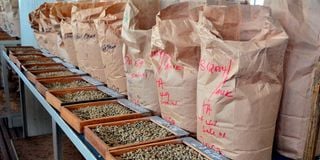
The Nairobi Coffee Exchange (NCE) has invited commercial banks to express interest in a proposed payment system ahead of an April 30 deadline to implement the scheme which is targeted at ensuring compensation to farmers within two days.
The NCE said it aims to introduce a Direct Settlement System (DSS) to facilitate efficient payment of growers’ proceeds as well as recovery of any other commitments owed by the grower to service providers.
“We are moving towards adopting a DSS and we have called on commercial banks to express interest in the system that is provided for under the Capital Markets Authority’s Coffee Exchange Regulations of 2020,” Mr Daniel Mbithi, chief executive of the NCE told Sunday Nation.
A DSS is popular among commodity traders because it enables transparency and predictability in payments.
In this new scheme, buyers will be required to immediately deposit funds in the DSS after every sale of coffee at the auction or through direct sales. The DSS provider or the commercial bank will then be settling statutory charges, their own service provider’s fees, and all other liabilities.
Presently, buyers pay money from sales of coffee to marketing agents, most of who double as commercial millers — an issue that has been problematic over the years since some rogue agents withheld the money for months or failed to disclose to growers their service fees.
Apart from the bad experience with agents, farmers have also been inconvenienced by coffee cooperative unions which market coffee on behalf their behalf but delay remitting proceeds from sales.
In the new trading regulations, it is no longer mandatory for farmers to appoint a marketing agent and farmers will have their cash proceeds directly through banks.
In the DSS system, a commodity exchange transmits trade details to clearing corporations on a real-time basis.
Upon receipt of trade details, the clearing corporation/clearing house notifies trading members about obligations. Clearing members receive communication regarding obligation and pay-in advice of funds.
Clearing banks are then instructed to make funds available by pay-in time. Pay-in of funds for executed trades is carried out by clearing banks by debiting the account of clearing members and crediting the account of the clearing corporation account with the amount due to them.
Kenya’s coffee is much sought after by roasters and blenders and the country sells its coffee to the world market. The international prices are used as a benchmark for the local price at the NCE.
Statistics released by Co-operatives and MSMEs Cabinet Secretary Simon Chelugui in December showed that Kenya’s coffee production volumes rose 50.24 per cent during the crop year 2021/2022 to hit 51,843 tonnes compared to 34,505 tonnes recorded a year earlier, buoyed by the provision of subsidised fertiliser and access to affordable farm inputs.
The coffee sector is, however, limping and requires a revamp as more farmers abandoned the crop for better rewarding ventures such as real estate and avocado farming.











